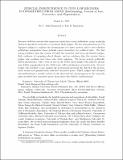|
Reseña:
|
Reseña:Because civil-law systems hire unproven jurists into career judiciaries, many maintainelaborate incentive structures to motivate their judges. We use personnel data on 276Japanese judges to explore the determinants of career success and to test whetherpoliticians manipulate those judicial career incentives for political ends. We ndstrong evidence that the system rewards the smartest and most productive judges,little evidence of on-going school cliques, and no evidence that the system favorsjudges who mediate over those who write opinions. We locate several politicallydriven phenomena. First, even as late as the 1980s, those judges who joined a promi-nent leftist organization in the 1960s were still receiving less attractive jobs. Second,judges who decided a case against the government incurred the risk that the govern-ment would soon punish them with less attractive posts. Third, judges who declaredunconstitutional a crucial section of the electoral law advantageous to the majorityparty received less attractive posts than those who held it constitutionalBecause civil-law systems hire unproven jurists into career judiciaries, many maintain elaborate incentive structures to motivate their judges. We use personnel data on 276Japanese judges to explore the determinants of career success and to test whetherpoliticians manipulate those judicial career incentives for political ends. We findstrong evidence that the system rewards the smartest and most productive judges,little evidence of on-going school cliques, and no evidence that the system favorsjudges who mediate over those who write opinions. We locate several politicallydriven phenomena. First, even as late as the 1980s, those judges who joined a prominent leftist organization in the 1960s were still receiving less attractive jobs. Second,judges who decided a case against the government incurred the risk that the government would soon punish them with less attractive posts. Third, judges who declaredunconstitutional a crucial section of the electoral law advantageous to the majorityparty received less attractive posts than those who held it constitutional. |

